Where Real Estate Marketing Guides Fail
Most step-by-step guides on developing a real estate marketing plan are general templates. They teach how to identify your target market and check key performance indicators.
They might unpack how to reverse engineer your competition and how to develop a real estate marketing calendar. But the buck stops there.
The other kind of guide lists specific marketing strategies, like blogs and email campaigns. However, they leave out how to effectively incorporate these tactics into a calendar. This is the Ultimate Guide to Real Estate Marketing Plans because it combines both.
We discuss the necessary marketing techniques that everyone should use. We also list many more optional tactics that may appeal to your specific skill set.
Then we sync these techniques with a real-life marketing plan, including an example calendar.
No guesswork, no big hanging questions. Just a fantastic real estate marketing plan you can see yourself in.
DIY Real Estate Digital Marketing Strategies
Some real estate professionals will want to try digital marketing on their own. If that’s you, we admire your ambition!
The video below covers great strategies for tackling DIY content marketing. The video is also useful for someone who wants to hire a digital marketing company, but would like a deeper understanding of the process.
The meat of the content starts at the 7-minute mark if you’re already familiar with my background and approach.
The One-Two Punch Strategy
1. Community Engagement
The best real estate marketing plan has two primary techniques. The first essential strategy is personal networking and community engagement. Word of mouth referrals remain the top method to generate new clients.
Pro Tip: Make yourself the “Digital Mayor” with NextDoor.
An excellent marketing plan carves out plenty of time for community prospecting. Check out our Ultimate Guide to Real Estate Prospecting for dozens of highly-effective methods for getting involved in your community.
Personal networking is also an essential part of being a top-tier realtor, especially for luxury realty. It allows you to understand your market deeply.
Importantly, it helps you create and modify the perfect real estate marketing plan for your area.
2. Real Estate Digital Marketing
The second essential technique is real estate digital marketing. Among the hundreds of marketing ideas out there, inbound strategies have the best ROI.
You pay once for a mind-blowing blog post, and it generates leads for years.
We hope you’re already aware that inbound lead generation through blogs and social media is the best marketing technique of today and tomorrow. Check out your potential ROI if you use InboundREM.
"Content marketing costs 62% less than outbound marketing, but generates more than three times as many leads.”
Both strategies should enjoy priority in your real estate or construction marketing calendar.
Especially if you entrust your lead generation to a real estate content marketing company, that frees you up to double down on community engagement or use other marketing strategies.
More Real Estate Marketing Ideas
Here’s the shortlist of our best alternative real estate prospecting strategies. For the full list (or details about each technique), check out our Ultimate Guide to Real Estate Prospecting.
- Approach large companies in your areas and recommend yourself for their relocation services
- Knock on doors but with a gift and a strategy
- Find a good CPA and become his or her client
- Buy a billboard or signage
- Leverage LinkedIn for real estate leads
- Invest in highly-attractive refrigerator magnets
- Build your Google My Business Page
- Develop a local real estate podcast
- Try using our most effective real estate postcard ideas
Step-by-Step Real Estate Marketing Plan
Since this is an ultimate guide, we’ve created a highly comprehensive marketing plan. Some of the initial steps require deep research, but the payoff will be huge.
If you’re an experienced realtor in your local market, the process should go quicker. It’s key to understand that the upfront research has multiple benefits.
You’ll see the market through a focused lens, speak authoritatively and insightfully with clients, and develop and tweak your marketing plan with genuine expertise.
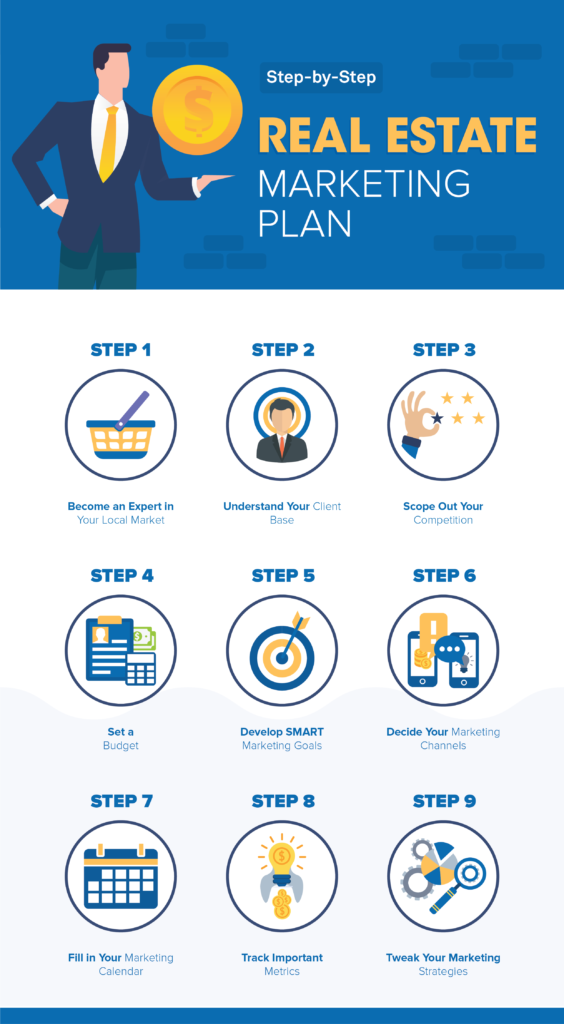
1. Become an Expert in Your Local Market
Gathering Data
Here’s the data you need to collect:
- Local market demographics
- Important local real estate niches and services
- Listing, sales, and financing data
- Your market share
- Competitor performance
The multiple listing service (MLS), or similar real estate organizations can provide you with these numbers. Additionally, these sources can help you find what you need:
- Federal Reserve System
- Bureau of Labor Statistics
- Mortgage brokers and bankers
- Census Bureau
- Chamber of Commerce
- County office
- Employment agency
- Wall Street Journal
Applying Data
Here are some ways you can apply this information to your real estate marketing plan:
- The younger your target market, the more you should rely on online inbound marketing like blogs and social media. Familiarize yourself with Pinterest, Instagram, meme culture, and video marketing.
- Elderly populations respond well to email marketing, door knocking, snail mail campaigns, Real Estate listing presentations, free luncheons, and seminars specifically for the elderly.
- Luxury real estate markets require highly aesthetic websites and Instagram pages, HD video walkthroughs including drone footage, and impeccable online reviews on your Google My Business page and elsewhere. Integrate yourself into the highest echelons of society possible when networking.
2. Understand Your Client Base
How to Create Buyer Personas
There are a few methods for understanding potential clients. They overlap in some ways, so it’s not necessary to do use all four techniques.
The first is to specialize in a real estate niche, from which you can generate a description of your ideal client.
The second is to research demographics from your target market.
The third is to build a few target client personas. These are imaginary individuals that represent your typical clients.
Here are some example questions you shouldn’t overlook:
- What are their concerns?
- What are their challenges?
- What makes them happy?
- What do they hope for in a realtor?
- What are their personal and career goals?
- What’s their lifestyle like?
- What’s their profession or education level?
- Where do they get their information?
- Who do they find trustworthy?
Pros and Cons of Buyer Personas
The drawback to creating client personas is that it can pigeonhole your understanding of your market.
Few communities are so homogenous that they can be reduced to a few example personas. However, the practice can provide helpful models as you try to appeal to a target audience.
Writing that Instagram caption or blog post becomes easier and more informed when you have specific individuals in mind.
Plus the task of generating these personas gets you thinking about aspects of your target client that you might have otherwise overlooked.
Alternatively, you can choose several real people that exemplify broad strokes of your target market and create content with them in mind.
The fourth, and perhaps most valuable, technique is to interact extensively with your community.
The first three methods provide a black-and-white picture of your client base. But getting to know real people will change that image into color.
3. Scope Out Your Competition
Researching other real estate agents in your area is an overlooked but valuable step for designing your real estate marketing plan. There are two main benefits.
First, you take a shortcut and discover which marketing strategies work well for your area. Perhaps the best realtor has an easy monopoly on Instagram. Then you should challenge that.
Second, you find out what your competition isn’t doing. In other words, you find the gaps where you can offer a unique value proposition.
Reverse Engineering
Your local market will determine how simple this process is. If you live in a friendly town, you may be able to chat up your competition and simply ask how they market themselves.
On the other hand, if you live in a dog-eat-dog metropolis this is probably a no-go. However, the more competitive your market, the better chance other real estate agents will leave an online paper trail of their marketing techniques.
When it comes to reverse engineering your competitor’s content marketing, this may be best handled by a real estate content marketing company, like InboundREM.
If you decide to do your own blogging, you’ll need to invest in Ahrefs or SEMRush for an insider’s look into your competition’s strengths and weaknesses.
Download our Real Estate Agent Competitor Analysis for a solid jumping-off point.
Be aware that if you’re a real estate agency, you should consider other agencies in this practice. If you’re a standalone realtor, reverse engineer other individuals.
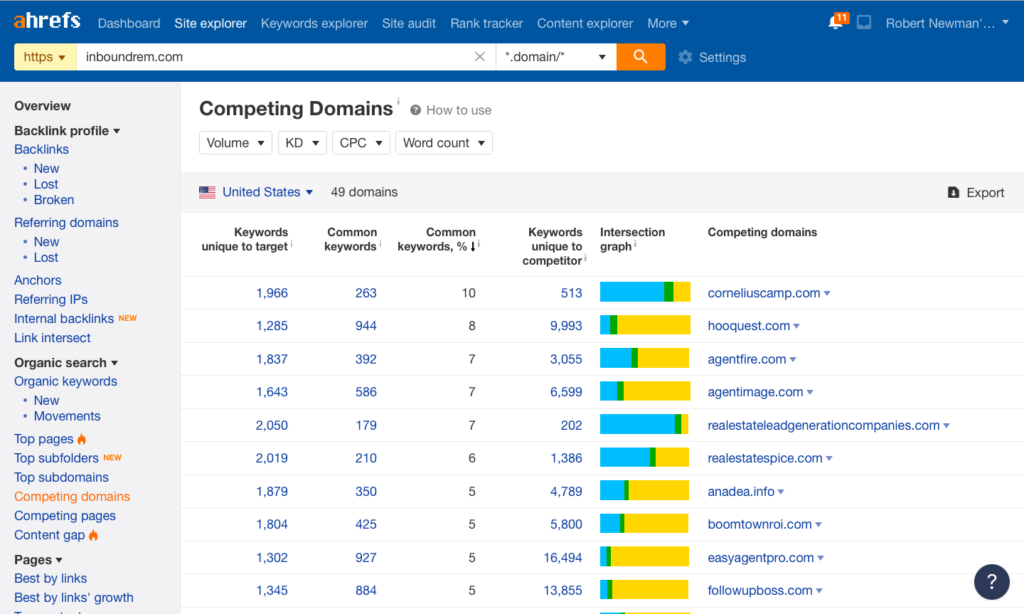
Unique Value Proposition
Once you’ve evaluated your competitor’s marketing strategies, you’ll see which areas are untapped.
Naturally it makes sense to fill these gaps if there’s reason to believe they will be effective in your market.
To round out this task, consider which strategies are (1) most effective and (2) fit within your strengths and lifestyle.
Your unquestionable expertise on the local market should be part of your UVP. If you don’t consider yourself an authority, then get to work!
Be sure to formulate your unique value proposition in a way that you can communicate to potential clients. It’s the equivalent of a 2-minute elevator pitch. But in this case, you’re selling yourself rather than an idea.
Free eBooks for Agents

Download any or all of our real estate marketing eBooks. These books contain cutting edge information, deep-diving case studies, actionable hacks to skyrocket your business.
4. Set a Budget
If you’re in a competitive market, expect to spend 15-20% of your income on marketing. Unless you have little competition, spending 30% can fast-track your efforts.
Of course the estimated costs for the below strategies can vary greatly. In fact, they should.
If your direct mail campaign is working wonders, then keep doubling down until you find the sweet spot for ROI.
For example, Victoria Spantis spends $500/month on direct mail, which is 60% of her annual budget. She enjoys a 30% market share using this campaign as her primary marketing technique.
These cost and time estimates represent a typical base-level involvement for each strategy.
Good Low-Cost Strategies
| Strategy | Cost | Difficulty |
|---|---|---|
| High-quality yard signage | $50/year | Low |
| Social media accounts | Free | Medium-High |
| Handwritten notes asking for referrals | $10/month | Medium |
| Client appreciation gifts | $50-$250/year | Low |
| Door knocking gifts | $50-$250/year | Medium |
| Podcast with interviews and local business features | $100 upfront plus $5-50/month for a podcast hosting service | Medium-High |
| Build a Google My Business page | Free | Low |
| Business cards | $150/year | Low |
| Host a webinar | Free | Medium |
| Host a seminar | Free or $250 to rent a hotel conference room | Medium |
Good Middle-Cost Strategies
| Strategy | Cost | Difficulty |
|---|---|---|
| Real estate postcards | $250-$1000+/year | Low or Medium |
| Refrigerator magnets | $250-$1000+/year | Low or Medium |
| Video marketing | $100-$1000+/year | Medium-High |
| Email marketing campaigns | $79/month for PropertyBase CRM | Medium-High |
| Community outreach events | $100-$250+/month | High |
| Branded merchandise | $50-150/month | Low or Medium |
Good High-Cost Strategies
| Strategy | Cost | Difficulty |
|---|---|---|
| Digital marketing services | $3000-$4000 upfront, $500-$2500+/month | Low |
| DIY content marketing | $500-$3000 upfront, $50-$2500+/month | High or Very High |
Note: There are many other high-cost strategies like billboards and television commercials, but nothing produces a ROI like online content marketing.
“We recommend dedicating 50-80% of your budget to digital marketing, because it’s where your ROI will be highest.”
5. Develop SMART Marketing Goals
Other real estate marketing plan guides direct you to develop goals as the first or second step. But goal setting is difficult to underestimate.
So it’s best to complete this step with as much information as possible. Assuming you have data on your performance in the past years, start by analyzing these metrics.
Which strategies worked well? Which strategies need optimizing? Which strategies should you implement next?
If you haven’t already heard, SMART goals stand for:
- Specific
- Measurable
- Attainable
- Relevant
- Time-based
Example SMART Goals
Here are some example goals that fit these criteria:
- Increase website traffic by 15% (to 3500 visitors/month) by December 31st, 2021 by publishing one SEOptimized, 2500-word article per week and generating 50 backlinks for high-performing articles.
- Increase seller leads generated online by 10% (to 25 leads/month) by December 31st, 2021 by rewriting 1 blog article per week to include calls-to-action and the downloadable pdf, The Austin Neighborhood Guide.
- Develop and implement 3 new full-day community outreach events, including a Mini-Pumpkin & Hot Cider Giveaway, and hand out at least 100 business cards along with grandma’s Pumpkin Pie recipe or branded drink koozies at each event.
- By April 1st, 2020, find a business mentor that also serves as a strong advocate and meet with them once a month.
Tips for Setting Goals
The first time you set SMART goals, it may be difficult to create informed and reasonable milestones.
Be sure to use your competitor research to establish realistic goals. Once you have a few years of data for yourself, the process should become easier.
As you carefully craft your marketing goals, think about 3-month, 6-month, and 1-year milestones.
Additionally, it’s important to consider these kinds of goals:
- Content Marketing Goals – Content generation, website traffic, social media followers
- Community Outreach Goals – New networking venues, optimizing existing outreach
- Lead Generation Funnel Goals – Seller and buyer leads, conversion rates, email open rate, closings
- Personal Goals – Finding a mentor, continuing education, new hobbies
Efficient time management is also crucial for meeting these goals. Implementing a real estate scheduling tool can help you stay organized, book more client meetings, and optimize your daily workflow.
6. Decide Your Marketing Channels
Digital Marketing
As mentioned, the best two real estate marketing strategies are digital marketing and community engagement.
These two channels play a central role in almost every highly-successful real estate marketing plan. It’s certainly possible to teach yourself real estate digital marketing and enjoy moderate or even high degrees of success.
However, the time investment can be astronomical. To generate a successful blog post on an already high-ranking site (apart from social media, email marketing, and backlinking), you need to become an expert in dozens of areas.
Here’s the short list:
- Keyword research
- Content mapping
- Competitor reverse engineering
- On-Page SEO
- Infographics
- Image & video sourcing
- Metacopy
- Calls-To-Action
- Readability
- Crafting titles and headings
- External authority links
- Internal linking
- Google SERPs
- WordPress publication
Honestly, I could’ve tripled the size of this list without losing steam. Beyond all these aspects, it can take years to develop the kind of engaging, super-informative writing style that both readers and Google loves.
How to Effectively Outsource Digital Marketing
One option is to hire a Content Marketing Manager for your agency.
The average salary is $52,000, plus marketing costs, which places this option outside the budget of many small agencies and almost all individual realtors.
If you do a deep dive, you may be fortunate enough to find both a freelance SEO content writer and a marketing manager who can work part-time at more favorable rates.
Of course, we are a digital marketing company with an iron in the fire. But the simple truth is that hiring a real estate digital marketing company is the most cost-effective option for many real estate agents.
InboundREM generates an excellent Return On Investment for its clients, as you can read in our ROI case study. Check out the reviews in the sidebar to see how universally pleased clients are with our real estate digital marketing services.
Secondary Marketing Channels
The key to choosing the best marketing strategies is aligning your budget with the most cost-effective strategies.
Refer to the budget section to explore some excellent options. It is also valuable to consider the successes and gaps of your competition’s marketing plans, your personal strengths and lifestyle, and local market demographics.
7. Fill in Your Marketing Calendar
This is perhaps the most difficult part for many real estate agents. How do you embed the concepts of good marketing strategies into a real-life timeline?
The solution is to review a model calendar template and tweak it according to your goals and needs.
Download our 100-Day Real Estate Marketing Calendar.
It includes 15 weeks of daily marketing tasks for the typical real estate agent. It’s a great resource to see yourself inside a real estate marketing plan with a realistic and effective timeline.
Scroll further to see the first month of model timeline!
8. Track Important Metrics
Digital Marketing Metrics
Google Analytics is the best free method for tracking key digital marketing metrics. Here’s a list of essential metrics you need to monitor:
- Total Website Traffic
- Traffic Sources (Organic Searches, Social Media, Backlinks)
- New vs Returning Visitors
- Average Session Duration
- Page Views
- Top Performing Pages
- Exit and Bounce Rate
- Conversion Rate
This guide to analyzing Google Analytics metrics is a great place to start.
If you have Ahrefs or SEMrush, these are excellent tools for monitoring success. They are especially great for seeing Google SERPs and how your articles rank and compare to competitors.
Additionally, CRM software platforms keep track of conversion rates and other important data. The more you can automate, the better.
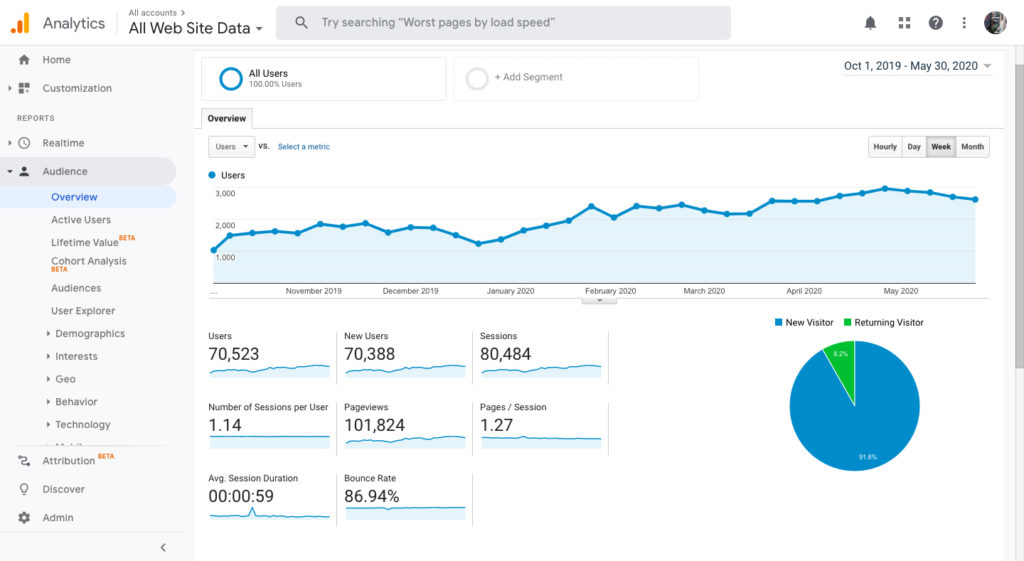
Non-Digital Metrics
We won’t lie. Tracking non-digital metrics, like qualified leads from real estate postcards, can be tedious.
It means asking every person who contacts you how they discovered you. Then you need to add a tick to your Excel sheet. Be aware that many leads will be exposed to more than one of your marketing strategies before getting in touch.
At the very least, keep track of the “cincher” strategies. These are the campaigns that convinced potential clients to pick up the phone or write an email.
Keeping Track of Your Marketing Plan
It’s important to have an Excel sheet measuring every channel of your marketing plan for every 3-month period, including these metrics:
- Total Cost
- Estimated Weekly Time Investment
- Estimated Reach (No. of People)
- Leads Generated
- Qualified Leads Generated
- Conversion Rate
- Cost Per Lead
- Time Per Lead
9. Tweak Your Marketing Strategies
Don’t Jump Ship Yet!
It’s essential to avoid jumping from strategy to strategy before you’ve optimized each one. Some marketing ideas have significant upfront costs or time requirements.
For example, you may spend $300 and thirty hours developing marketing videos. Smartly, they feature interviews with satisfied clients and local businesses. But the result has been only 50 views and zero generated leads.
It’s not time to move on, but time to improve your method. You probably need to expand your follower base, emulate videos from pros, and produce content on topics with more searches.
Be a Feedback Hound
Pro Tip: The key to tweaking unsuccessful marketing campaigns is analyzing why you’re not gaining traction, and the key to analysis is helpful feedback and perfomance metrics.
As often as possible, speak to your potential client base. Definitely change anything negative or underwhelming, but don’t be easily satisfied by positive feedback.
Good is not good enough. Everything you do should wow your potential clients. Until you reach that point, your strategy is not fully optimized.
For real estate marketing campaigns, it’s wow or nothing.
Be a Metrics Demon
Beyond feedback, use metrics from SEO and CRM software platforms, as well as advice from marketing experts.
For example, your CRM software might show that your conversion rate for opened emails is strong, but your percentage of opened emails is weak. In this case, you need to write more engaging headlines.
Evergreen Strategies
Certain strategies, like blogging, email campaigns, video marketing, and community engagement are tried-and-true.
Generally, these ideas are either successful or not-yet successful. Stick to them! Other strategies, like hosting real estate seminars, might have insufficient potential.
Maybe the amount of time needed to become an excellent public speaker is too much. Maybe your market is too young, and you need to switch to webinars.
Step-by-Step Marketing Plan List
- Research your local market using the MLS and other resources and then generate a reference document.
- Create client personas using local demographics, real people, and your real estate niche
- Fill out the Competitor Analysis Excel sheet
- List marketing strategies untapped by competitors
- List and prioritize secondary marketing strategies that appeal to your strengths and lifestyle
- Determine your monthly budget
- Choose which marketing strategies to pursue based on the above steps
- Write 3-month, 6-month, and 12-month SMART goals for content marketing, lead generation, and community outreach
- Fill out your real estate marketing plan calendar with 1-4 hours of tasks each day
- Monitor relevant metrics and create Excel sheets for comparison
- Reevaluate your strategies every 3 months
- Tweak your marketing plan accordingly
- Reevaluate your local market and competitors once a year
Real Estate Marketing Plan Calendar Template
This downloadable 100-Day Real Estate Marketing Plan Calendar is for an individual real estate agent who has decided to personally use community engagement, email marketing, and real estate postcards.
They have decided to outsource website development, blogging, and backlinking to a real estate digital marketing company. For now, they would like to try email marketing themselves.
Eventually they may hand it off to the digital marketing company. The email campaign could easily be substituted with Instagram posts, video marketing, or any digital strategy that requires building and engaging with followers or subscribers.
In this example, the realtor has a moderate annual budget of $5000-$10,000. They have decided to invest about 15 hours per week into their real estate marketing plan.
| Day | Task | Time (Hours) |
|---|---|---|
| Week 1 – Gather Market and Competitor Data | ||
| 1 | Gather local market research using the MLS and other resources | 2-4 |
| 2 | Generate a reference document including a summary about which marketing strategies apply best to your local market | 2-3 |
| 3 | Use market data and personal connections to create client personas | 2-4 |
| 4 | Research your top 3-5 competitors and begin the Competitor Analysis | 2-3 |
| 5 | Research your top 3-5 competitors and complete the Competitor Analysis | 2-3 |
| 6 | Off | |
| 7 | Off | |
| Week 2 – Reverse Engineering | ||
| 8 | Reverse engineer your competitor’s successful marketing strategies. Sign up for their email newsletters, Instagram posts, etc. | 3 |
| 9 | Reverse engineer your competitor’s successful marketing strategies. Sign up for their email newsletters, Instagram posts, etc. | 3 |
| 10 | Reverse engineer your competitor’s successful marketing strategies. Sign up for their email newsletters, Instagram posts, etc. | 3 |
| 11 | List potential marketing strategies based on competitor research and reverse engineering | 2-3 |
| 12 | Prioritize strategies that fit the local market, competitor strategies, and your personal strengths and lifestyle | 3 |
| 13 | Off | |
| 14 | Off | |
| Week 3 – Hire a Real Estate Digital Marketing Company | ||
| 15 | Generate your annual marketing budget | 3 |
| 16 | Research and contact different real estate marketing companies. Narrow your search to 3-5 candidates. | 3-4 |
| 17 | Have kick-off Zoom meetings with your candidates. Submit your Local Market data, client personas, and marketing strategies research. | 2-3 |
| 18 | Continue kick-off Zoom meetings with your candidates | 2-3 |
| 19 | Select the best digital marketing company for you. Have another Zoom meeting and request a digital marketing plan and timeline that suits your budget and needs. | 2-3 |
| 20 | Off | |
| 21 | Off | |
| Week 4 -Begin Implementing Marketing Strategies | ||
| 22 | Install and familiarize yourself with a Real Estate CRM | 2-3 |
| 23 | Set up a detailed Google My Business page | 2-3 |
| 24 | Review and discuss the digital marketing company’s plan, timeline, budgeting, and marketing goals. Jump on Zoom again if necessary. | 1-4 |
| 25 | Create SMART goals with the digital marketing plan in hand | 3 |
| 26 | Set up a Facebook Business page and other social media accounts as necessary | 2-4 |
| 27 | Off | |
| 28 | Off | |
| Week 5 – Email Marketing Campaign | ||
| 29 | Research email marketing campaign techniques | 3 |
| 30 | If possible, reverse engineer competitor email campaigns and experts outside your market. | 3 |
| 31 | Continue researching email marketing campaigns | 3 |
| 32 | Install and familiarize yourself with email marketing software | 1-2 |
| 33 | Outline an email marketing campaign with topic ideas (including the blog posts from the marketing agency), email frequency, automated campaigns, etc. | 3-4 |
| 34 | Off | |
| 35 | Off | |
Here is the full downloadable 100-Day Real Estate Marketing Plan Calendar.
Real Estate Marketing Plan Tools
- MailChimp is a trusted and popular option for email marketing campaigns.
- Ahrefs or SEMrush are the best platforms for keyword research and reverse engineering your competitor’s website.
- Google Analytics is the best free method for tracking digital marketing metrics.
- Follow Up Boss is an excellent option for real estate CRM (Customer Relationship Management) software.
- ActiveRain is an online community of real estate professionals who write blogs, exchange best practices and share information.
- Spacio is a great tool for gathering info from potential buyers during an open house.
Recommended Articles
If you found this resource helpful, read more of our best articles. All of our content is built on honesty and expertise, so you can strategize your professional life with the very best information.
Beyond that, check out InboundREM University, a huge podcast library that discusses everything from developing a successful digital marketing plan to using TikTok to build an audience of 70,000.
How InboundREM Can Help
We provide a full suite of real estate digital marketing services. Our expertise includes website development, real estate SEO, super-effective blogs, social media marketing, brand building, and backlinking.
Another popular offering is our consulting sessions. If you’d like to become one of the 20+ real estate professionals who contact us each month about increasing their leads by 200-500+%, please reach out!
Contact Form
Schedule a Meeting
Let’s chat about how an SEO-focused website that YOU OWN, Google Business Profile Campaigns, or Custom Email Campaigns can generate high-quality leads and exceptional long-term ROI. If my services aren’t the best move for you, I’ll gladly point you in the right direction

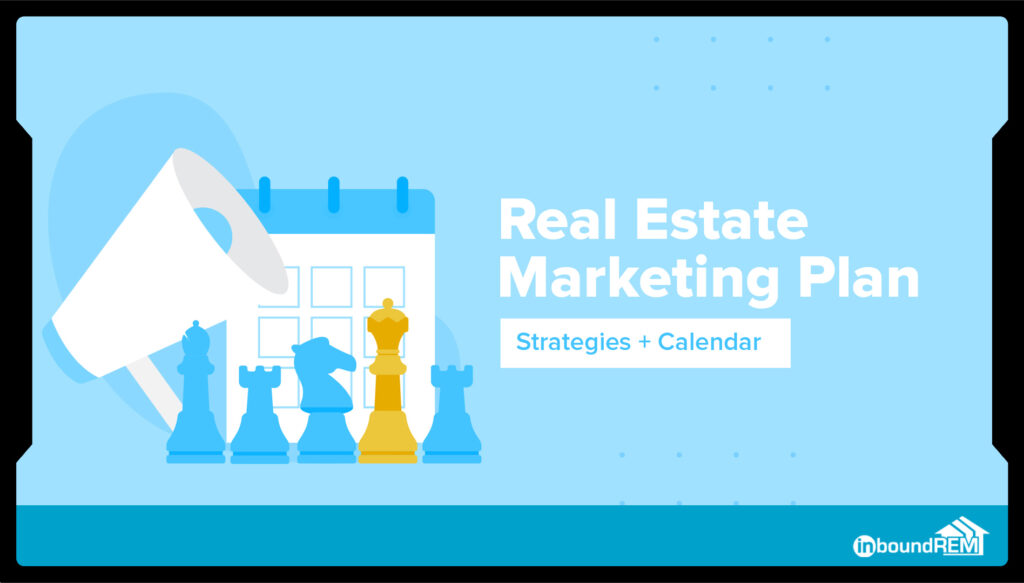
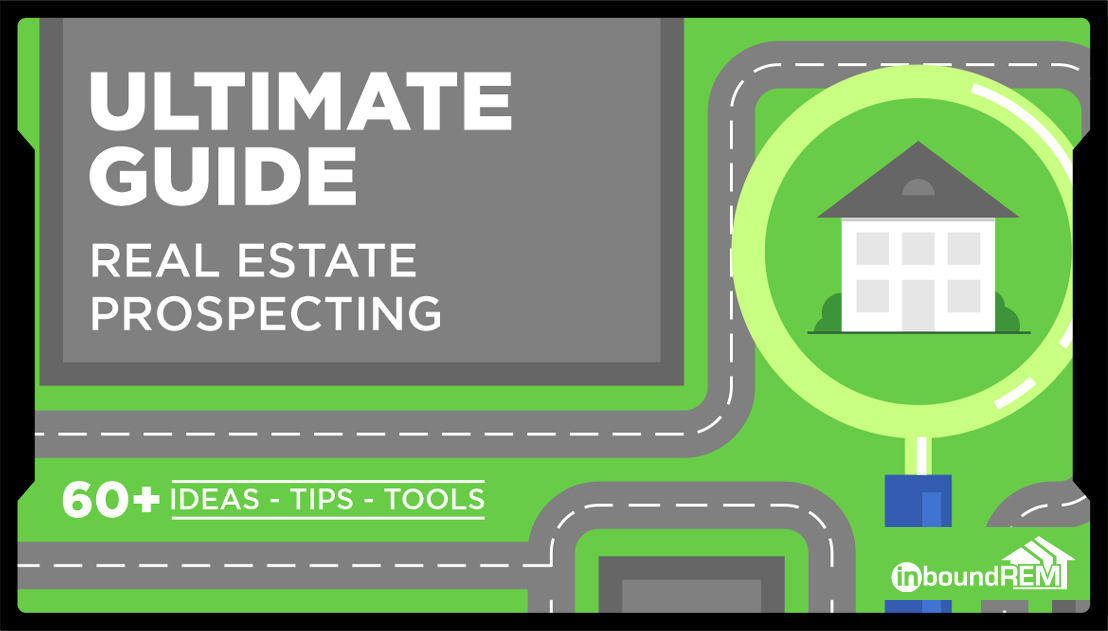
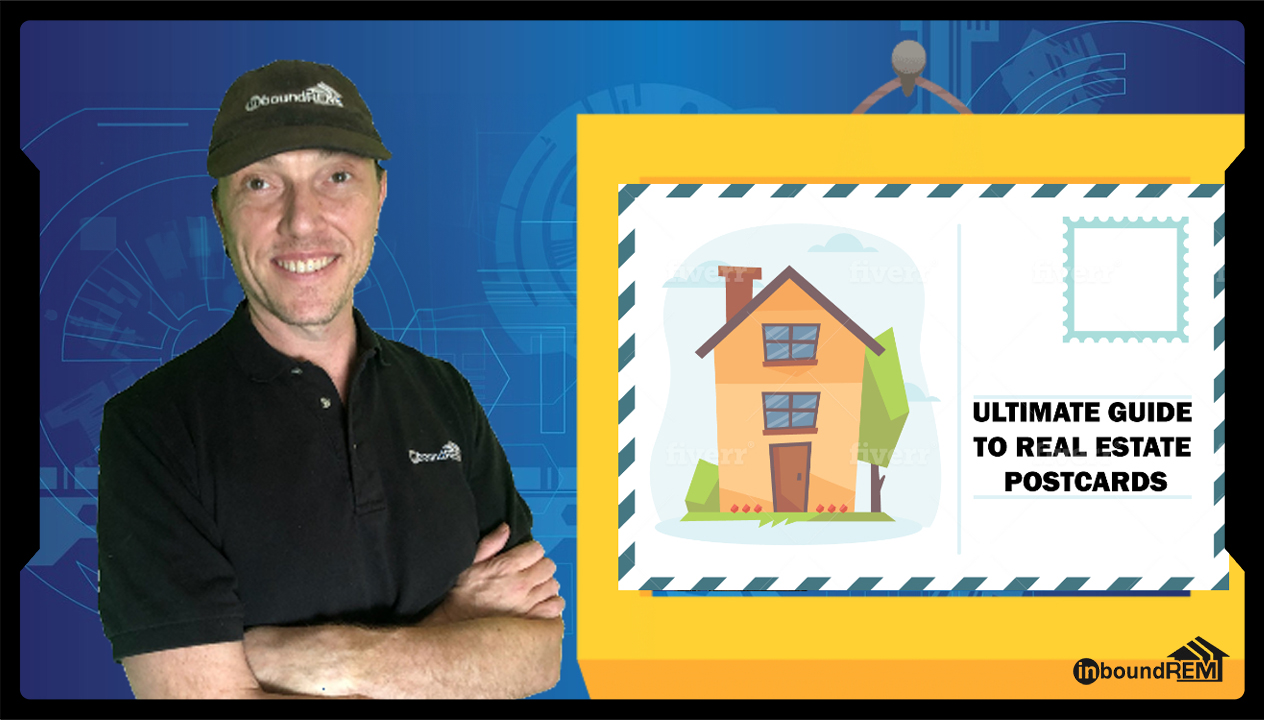
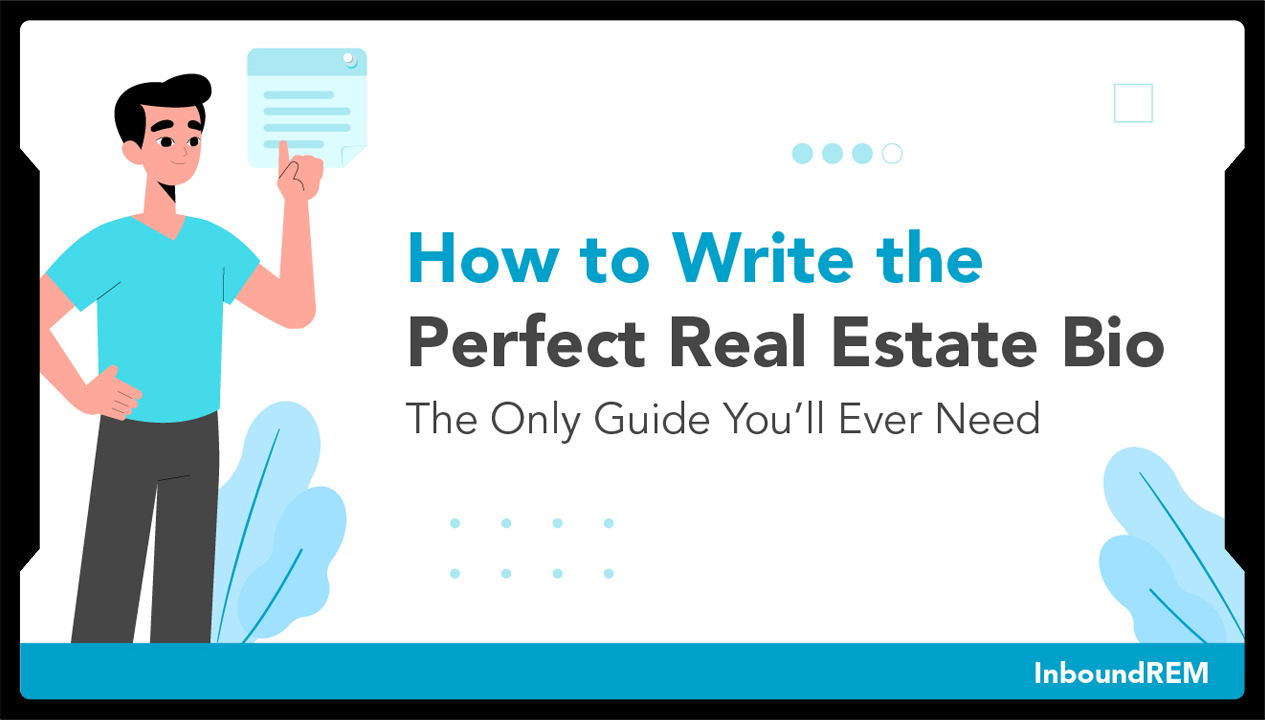
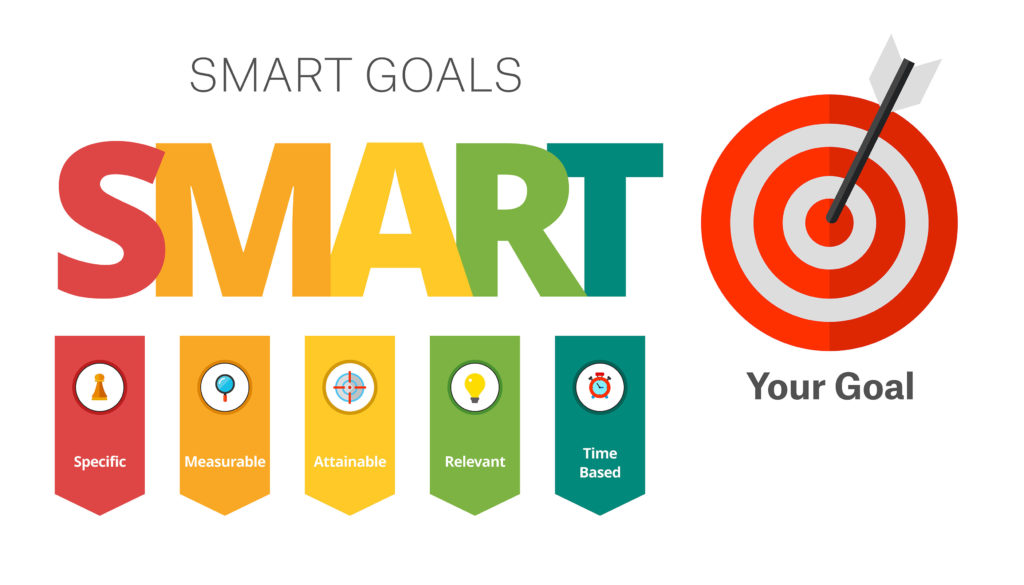








7 Comments
Are you still doing websites……..
Yes sir! Responded directly by email.
Real estate marketing plans are good for your business and thanks for sharing this information with us.
Very effective strategies for real estate. Really helpful
Glad you thought so. We worked hard on this.
I appreciate the effort you put into researching and writing this post. Keep it up!
These are some great points that I haven’t even considered until now! Thank you for putting together this super helpful article.